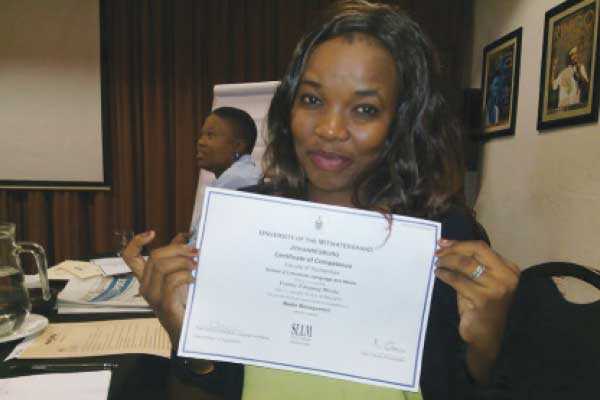What I learnt from Women In News
Last year, WIN-IFRA combined its Sida-funded Women in News Africa programme with its Norwegian Ministry of Foreign Affairs-funded programme to workshop participants in media management, peer mentoring and networking events.
The group of 45 high potential editors and journalists from Botswana, Rwanda, Zambia and Zimbabwe (Sida-sponsored delegates) and Kenya, Malawi and Tanzania (Norwegian-sponsored delegates) met on two occasions throughout 2016 to discuss serious issues pertaining to succeeding as a female journalist. Topics covered include Human Resource management, Finance, Marketing, Editorial, among many others. We interrogated impediments to the success of female journalists in newsrooms and came up with suggestions on how we can improve our careers and further help other women in our newsrooms.
WIN also provided a career roadmap coach for each country, the participant is tasked with guiding women in their career paths. A landmark survey in 2011 of more than 500 media companies worldwide found that women made up only about one-third of the journalism workforce. Although internationally newsrooms have seen some progress over the past few decades, there is little doubt that inequalities still exist in terms of women achieving equal pay and top positions, as well as longevity in management, suggesting both a glass ceiling and ‘glass cliff’ problem.
A survey undertaken by US-based International Women’s Media Foundation in conjunction with International News Safety Institute in August 2013 shows that women journalists are faced with unpleasant circumstances at work and on the field. The global report, released in January this year shows that 98 of the 1078 female journalists interviewed from around the world are working in unhealthy environments due to harassment and violence. Nearly two-thirds of respondents said they had experienced some form of intimidation, threats or abuse in relation to their work, ranging in severity from name-calling to death threats. Majority of threats, intimidation and abuse directed toward them occurred in the workplace and was perpetrated most often by male bosses, supervisors and co-workers.
It also found that most incidents of harassment and violence were never reported, even though a majority said they were psychologically affected. In response, one of the local female journalists interviewed in one of my articles ‘Female journalists abused,’ said the most predominant challenge she encounters is intimidation. “Our male colleagues don’t take kindly to a woman showing signs of maturity in their reporting,” she says, hence the many cases of sabotage where good stories begin to go unpublished. She has also received threats from sources, their friends and families after publishing a story in which they were involved. She has been promised beatings and called all sorts of demeaning names.
University of Botswana Media Studies lecturer Letshwiti Tutwane has observed that men see women in the local workplace as sex toys, whether single or married. He was shocked when one of his students confessed that a top government official wanted to have sex with her. She is doing her three-month internship, which is part of the programme. “Women should speak out and expose any acts of misconduct toward them and the culprits must face the wrath of the Law,” he says, adding that women should be professionals before anything else.
These were, but a few, experiences further shared by WINners (as WIN members are called). However, in the wake of finger pointing and victim-playing attitude arose a revelation that women also should come to the party. Newsroom will only become ‘A Boys’ club’ if we allow it. The media industry is by far one of the most challenging jobs ever and it takes a determined man and woman to stay relevant.
While throwing pity parties about being mistreated, there is already a deadline to meet and next thing, your name does not appear anywhere in the newspaper. Week-in week-out. Coming from a newspaper background, I realise that one’s byline carries their life. The type of stories you write, quality and your consistency count.
Your byline exposes you to outside markets. Reality is that the public (readers) is our final judge. So, the more we focus on negativity, the more we are going to lose focus and harsh as it may sound, become irrelevant. People often describe journalism as a calling or passion.
I believe it takes mindset change to thrive in this, otherwise male-dominated industry. This does not mean condoning any form of harassment though. Perpetrators must face the music. Companies, through their Gender policies should assist in preventing discrimination and abuse. Finally, through WIN programme, we were enrolled with University of Wits in South Africa where we studied Media Management. The graduation was last week for Botswana WINners and the new intake for 2017 started.






